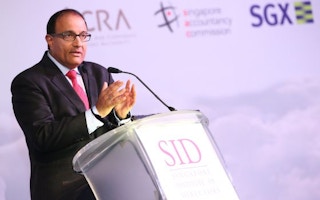Innovation is the “only sustainable competitive advantage of the 21st century economy”, and this is why political and business leaders alike must pay particular attention to it, said Singapore’s Second Minister for Trade and Industry S Iswaran on Wednesday.
Addressing a 700-strong audience at the sixth annual conference of the Singapore Institute of Directors, Iswaran emphasised that an organisation’s ability to innovate in a knowledge-based economy has “significant impact on its long term potential and its competitiveness”.
But even though innovation can yield results, it is a risky process that requires perseverance. The cost of innovation is incurred in the short term, with the payoffs being realised in the medium to long term, so it is “precisely because of this temporal disconnect, between its short term costs and long term benefits, that innovation must be on the agenda of a country’s and company’s leaders”, he said.
Business leaders have the responsibility to nurture a culture of innovation so that resources for this is allocated and sustained. “Unless there is that alignment and commitment at the leadership level, it is difficult to persist in this effort, especially when the going gets tough,” he added.
Citing Sembcorp Industries, a leading energy, water and marine group in Singapore, Iswaran noted how the company maintained a culture of innovation to drive growth through its Technology Advisory Panel. This panel comprises board members and external technology leaders who oversee the application of emerging and potentially disruptive technologies.
With the help of specialised expertise, Sembcorp’s board ensures that technology is appropriately harnessed to achieve results, he said.
In Singapore, Sembcorp is developing a new energy-from-waste plant on Jurong Island which when completed in 2016 will deploy the latest technologies to produce 140 tonnes per hour of steam using industrial and commercial waste collected by its solid waste management arm.
Singapore has also consistently made massive investments into research and development. Even through the global financial crisis in 2008 to 2009, it maintained this spending, noted Iswaran.
Between 2011 and 2015, the government committed S$16.1 billion to support research, innovation, and enterprise activities. This has enabled Singapore to generate commercially viable private sector solutions, Iswaran noted.
For example, the national water agency PUB worked with the Agency for Science, Technology and Research (A*STAR) to develop an intelligent water quality monitoring system to keep reservoir waters safe.
The result was a commercial entity - ZWEEC Analytics - which developed a smart and accurate video and data technology to keep drinking waters safe. This solution has since been adopted by the Taiwan Water Corporation and the Yangtze River Water Resources Commission.
Iswaran also highlighted emerging sectors like advanced manufacturing and clean technology as promising areas, noting that Spring Singapore, a local government agency that support SMEs, has called for and received proposals to appoint accelerators to co-invest and incubate high-potential technology start-ups in these sectors.
Speaking at the event held at Marina Bay Sands, Emeritus Professor Jean-Philippe Deschamps, from Switzerland’s International Institute for Management Development told business leaders that they must move away from the “tyranny of short-term profitability” to view innovation – and the investment it requires - as part of corporate governance.
He also noted that companies around the world are increasingly using sustainability as an innovation driver.
In particular, the concept of the circular economy is gaining ground, he added. This involves re-thinking business models and restructuring manufacturing and product design in a way that the materials used are returned to the value chains, product lifespans are extended through repair and refurbishment, and consumption is viewed in terms of temporary services rather than permanent ownership.
“This enables companies to broaden the scope of its efforts beyond products and services,” he said.
Formed in 1998, the Singapore Institute of Directors is the national association of company directors. The SID Directors’ Conference is held every year to develop leadership capabilities for Singapore business leaders.
The SID works with the Centre for Governance, Institutions and Organisations (CGIO) on the Asean Corporate Governance Scorecard, which quantitatively scores the top 100 listed companies in six Asean countries, based on their compliance with the OECD Code of Corporate Governance.
Based on this success, SID CGIO and CPA Australia are now developing a national index – the Singapore Governance Transparency Index – to assess corporate governance of all Singapore listed companies. The first listing will be published next year.

















